Discover and work with the two systems of your brain!
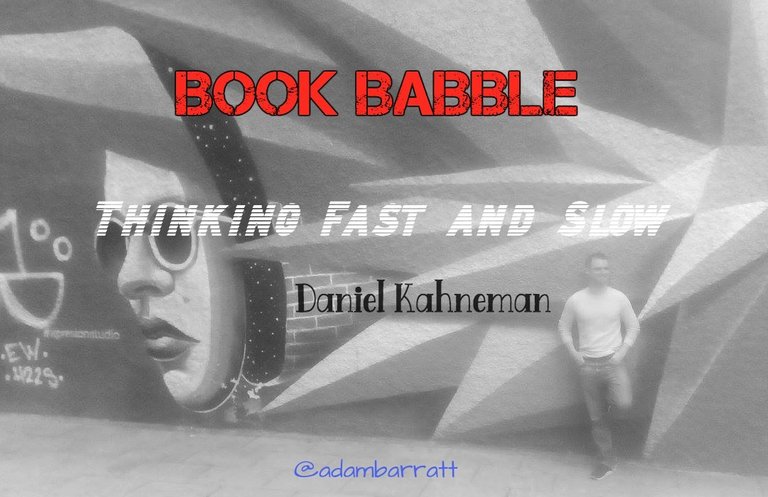
I read this classic recently, and it's a great book on the different aspects of our brain and how they work together (or not)…
The crux is that you have two systems in your brain that are fighting for control over your behaviour and actions… this can lead to many ways in which they influence errors in memory, judgment and decisions.
It's the condensed life work of Nobel-prize winning psychologist Daniel Kahneman and goes deep into the psychology of why we think the way we do.
A lot of what is described was worked on with his colleague and friend over many years, Amos Tversky, and concepts that they worked on together and Kahneman continues with.
Not long ago, we discussed Predictably Irrational and that complements this well in terms of the decision making process. In fact, Dan Ariely references this book a lot and he isn't the only one.
A deep dive, so let's dive right in. I won't cover the 200+ highlights, but will pick out some key concepts…
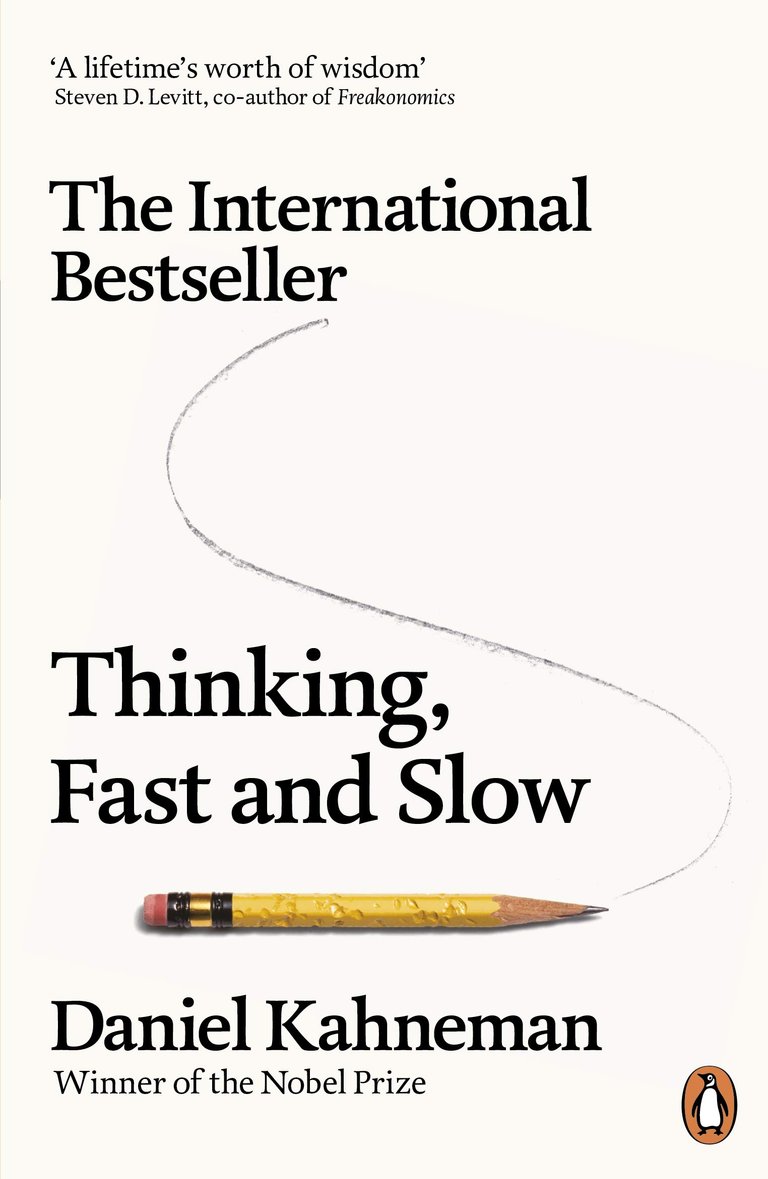
Highlights from the book, followed by my thoughts!
the halo effect
The Halo effect is where we base our opinions of a person (or situation) on one aspect that we like and then liking everything about them based on that. Much like a halo, it's blinding us to reason and we're just taking the easy route rather than weighing each thing up on its own merits.
The reverse is also true of course: If we dislike a person, then even if they say and do some objectively great things, we still tarnish those things as bad.
It just makes things easier for us to digest and organise. Never do you see this more than in public life with politicians, 'celebrities' et al.
The media and PR folk know this. How often are people just painted as 'good' or 'bad' and despite whatever they do, nothing really changes people's overall opinion? That would require additional effort after all.
Much of the discussion in this book is about biases of intuition
Much of the book is about biases in general, intuition being a core driver. We lean certain ways and jump with what we've got. We simply don't have time (or inclination) to weigh up every single moment, so we group things together to our best guess.
People tend to assess the relative importance of issues by the ease with which they are retrieved from memory—and this is largely determined by the extent of coverage in the media.
Things at the top of mind are most easily accessible and are what's likely to be used. So front and centre of mind will mean that's what we get to first. That's why media coverage is so important and shapes everything, even though people think they are just passively watching the 'news'.
The situation has provided a cue; this cue has given the expert access to information stored in memory, and the information provides the answer. Intuition is nothing more and nothing less than recognition.
Intuition isn't some deep psychic-type ability. It's more something that's brought to the fore when presented with certain scenarios, which when recognised shows itself.
This is the essence of intuitive heuristics: when faced with a difficult question, we often answer an easier one instead, usually without noticing the substitution.
Substitution is talked about a lot in this book. Very often we aren't actually answering a question given, but finding a much easier similar question and that being sufficient to cover what's being asked.
And people are then so sure about their stance on an issue, when it hasn't really been deeply deliberated.
System 1 operates automatically and quickly, with little or no effort and no sense of voluntary control. System 2 allocates attention to the effortful mental activities that demand it, including complex computations. The operations of System 2 are often associated with the subjective experience of agency, choice, and concentration.
This paragraph goes into the main make-up of the book and succinctly sums things up. System 1 and system 2 at play.
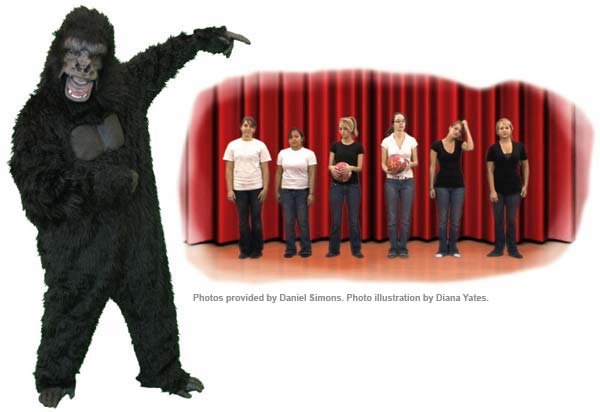
The Invisible Gorilla
We talked about this study in the Jordan Peterson BookBabble, and it's where observers were asked to watch some people throw around a basketball and were given a task like count the passes.
As they were so focused they didn't see someone dressed in a gorilla suit run on!
The gorilla study illustrates two important facts about our minds: we can be blind to the obvious, and we are also blind to our blindness.
One of the tasks of System 2 is to overcome the impulses of System 1. In other words, System 2 is in charge of self-control
System 1 is more instinctive and system 2 assesses the situation and decides on action if given the time.
This reminds me a little of an earlier BookBabble where we discussed The Chimp Paradox by Steve Peters. Peters used the analogy of a chimp and other aspects to represent the parts of the brain. Worth a look back at that one too!
Müller-Lyer illusion
This is a famous optical illusion. It consists of two sticks, one framed by closed fins and one framed by open fins. After seeing the illusion, viewers usually estimate that the stick with two open fins is longer, even though the sticks are actually the same length.

The psychologist Mihaly Csikszentmihalyi has done more than anyone else to study this state of effortless attending, and the name he proposed for it, flow, has become part of the language.
Our old friend Flow. This is a state of 'being in the zone' and being fully focused and submerged in an activity. We also have an article on that very book!
ego depletion
This is the idea that self-control or willpower draws upon a limited pool of mental resources that can be used up. 'Ego' being used here in the more psychological sense rather than the everyday 'being big headed'.
Once reserves run low, you tend to opt for easier options. Which is why having good habits to fall back on is so important. In these moments of depletion, you will do the things that are easiest and what you're primed to do.
tired and hungry judges tend to fall back on the easier default position of denying requests for parole. Both fatigue and hunger probably play a role.
And here is a great example. If in doubt in this context, you are going to deny parole to be on the safe side as you can't really offer full energy to assessing the merits.
I was also watching Dragon's Den the other day, and I thought that might be similar. Depending on when you catch them and how they're feeling, they are going to be more or less inclined to make an investment.
A bat and ball cost $1.10. The bat costs one dollar more than the ball. How much does the ball cost?
Our instinct is to go for an incorrect answer here. It should be obvious with a bit of thought, but we simply don't do it unless pressed. You may first see it and think '10c' but it would actually be 5c. Looking at it briefly gives you an 'obvious' answer but it doesn't take a maths genius to work out the true answer… but it does require a pause and a few seconds to do the work.
many people are overconfident, prone to place too much faith in their intuitions. They apparently find cognitive effort at least mildly unpleasant and avoid it as much as possible.
It's not just the wrong decisions, it's the fact that people are super confident about them that's even more concerning. They just don't see it until it's pulled apart a little.
Intelligence is not only the ability to reason; it is also the ability to find relevant material in memory and to deploy attention when needed.
Intelligence is a wide term. As stated here, you do need to be able to reason and reach logical conclusions, but also apply yourself diligently and in the right places where required. And having that wisdom to know how and when to do so.
priming effect
Being exposed to something prior to something else with that first thing now influencing your thoughts on what's to follow. Most people have no idea how much this has an effect, and how much it's used. What you're primed with is absolutely going to put your mind at a certain point and then the things you see after will be put into that context.
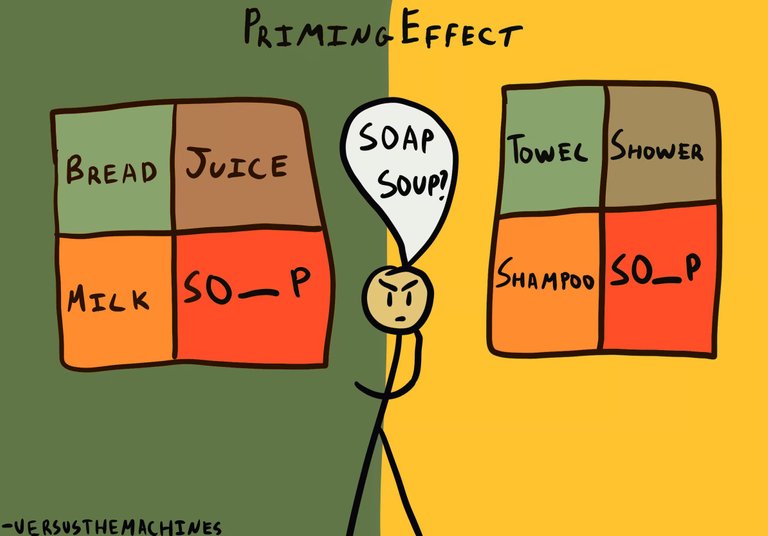
A reliable way to make people believe in falsehoods is frequent repetition, because familiarity is not easily distinguished from truth.
Sound familiar? Frequent repetition is clearly a tactic used by many, in all sorts of circumstances. Sometimes you're aware and wonder why, but it doesn't matter as it works. It can become the 'truth' by default, as it's what's spoken the most.
exposure effect
Repeated exposure to something can make it more pleasant, as you're more used to it and becomes a part of your experience. This can apply to people too, as your friends and family are built over many interactions… they may not be objectively 'better' than other people, you just know them (withstanding any family feuds etc. ;)).
How many animals of each kind did Moses take into the ark? / Moses illusion
The Moses illusion displays how we aren't really paying attention and grouping things into familiar territory. What's wrong with the riddle this refers to is that Moses had nothing to do with the ark. It was Noah.
people are prone to apply causal thinking inappropriately, to situations that require statistical reasoning.
And here we have a major issue. There is a time and a place for all reasoning but people get confused as to what's relevant (and more importantly what isn't). We're always looking for cause and effect. The author would definitely identify as a scientist and take that approach.
Jumping to conclusions is efficient if the conclusions are likely to be correct and the costs of an occasional mistake acceptable, and if the jump saves much time and effort. Jumping to conclusions is risky when the situation is unfamiliar, the stakes are high, and there is no time to collect more information
Weighing up the probabilities and acting appropriately. There will be times where jumping to conclusions make sense and statistically are good to go with. There are others where this should not be happening and a further insight is required. Again, this is where many go wrong.
recent events and the current context have the most weight in determining an interpretation.
What's happened most recently and how it fits in to the world right now is given more weight.
when System 2 is otherwise engaged, we will believe almost anything.
A little misdirection… keep that system 2 occupied over here and it's abandoned it's filtering duties. Therefore all sorts can seep through.
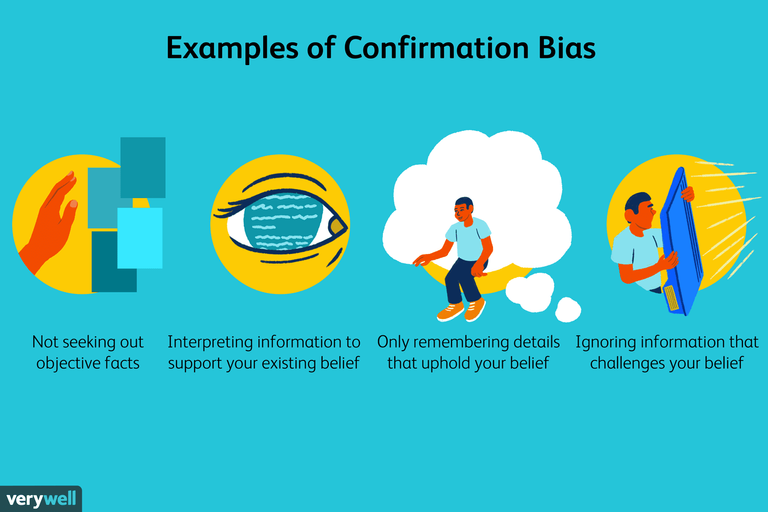
confirmation bias
We're always looking for evidence that what we believe is true, not necessarily looking for the Truth. We may think we are being fair, but many times equal information is either cast to one side or integrated into our views as we see what we want to see.
people (and scientists, quite often) seek data that are likely to be compatible with the beliefs they currently hold
This is a problem, especially when 'scientists' are as bad culprits as the rest of us!
If a satisfactory answer to a hard question is not found quickly, System 1 will find a related question that is easier and will answer it
This goes back to substitution from earlier. We're always looking for the easy way out and will shimmy across - subconsciously - to answer an easier related question that satisfies us as an answer to the original.
extreme outcomes (both high and low) are more likely to be found in small than in large samples.
Statistics are only really of use with a wide enough sampling pool. Otherwise you're open to anomalies and influences of that particular group (of which there can be many and give a distorted view).
Because the events are independent and because the outcomes B and G are (approximately) equally likely, then any possible sequence of six births is as likely as any other.
If each event is 50/50 then that remains for each time. So having 10 in a row of something may not be as crazy as you'd first think. They're all independent events, but then again, over a period of time that should even out.
We are far too willing to reject the belief that much of what we see in life is random.
The book poses that much of life is luck and random. This goes against a lot of popular wisdom out there - you create your own reality and the like.
Yes, you have a huge influence over everything, but ultimately some small things going or not going your way can dramatically affect your path.
Much out there is happenstance and not to be read too much into. This can be debated in a scientific and spiritual sense, but sometimes things just are the way things are. And with no reason.
With a few horrible exceptions such as 9/11, the number of casualties from terror attacks is very small relative to other causes of death.
An example here of where you focus attention (you can discuss Covid or anything else here too). As bad as terrorism is, it isn't that large a problem statistically speaking.
Yes, that's no consolation to those affected by it, but the coverage and whole campaign is disproportionate.
Those other causes of death effect people too ;).
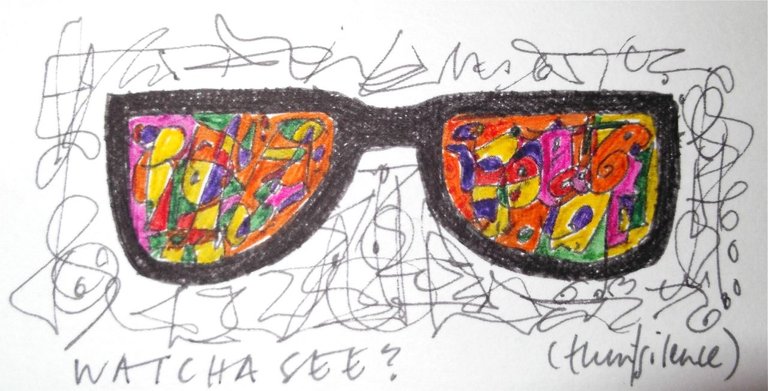
WYSIATI
This is a central concept in the book and repeatedly referred to.
WYSIATI is an acronym that stands for 'what you see is all there is' and refers to the fact that we normally make our judgements and impressions according to (only) the information we have available.
We don’t tend to spend too much time assessing what we don't know or acknowledging that it's even there. We simply assert what we do know.
rewards for improved performance work better than punishment of mistakes.
Most of us know this, that encouragement works far better than the opposite in getting us to maintain and even raise our game. There is a place for both carrot and stick, and in times gone by punishment may have done the trick. But in more modern times it's clear that you need to inspire people to act of their own accord (rather than being forced).
This is not a case though of 'everyone gets a medal for taking part'. All the wishy-washy back-slapping for doing nothing is going too far the other way. The point is positive reinforcement and leaving any 'punishments' for if and when it's truly appropriate.
regression to the mean
Averages averaging out…
In a sample that would be 50/50, for example, and in one study the result was 80/20 and a second it was 20/80, they have both veered off from the average in different directions.
If they then took the test again, they are each most likely to be closer to 50/50. That may mean that one group has performed 'better' and the other 'worse' than the first time but really it's just a case of regressing to the mean, ie. averaging out.
It's simply a case of extreme events are likely to be followed by more typical ones.
luck played a role in the outcome
Kahneman talks a lot about luck… and he being a man of science, that's very interesting. No matter the study or variables at play, some things are just chance.
narrative fallacy
This refers to the tendency of people to create simple and flawed stories out of a sequence of facts to make sense of the world. We place too much weight on talent, stupidity and intentions rather than luck.
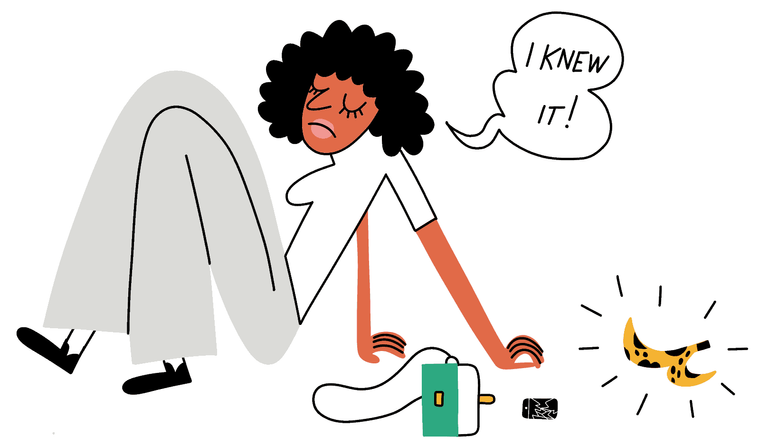
“I-knew-it-all-along” effect, or hindsight bias
People after the event stating how obvious it was, but the facts are all clearer now as it's already happened!
They've convinced themselves they accurately predicted the event, whereas that may not quite be the case, as they've filled in a few gaps since then and it's moulded together.
Also known as 'creeping determinism'.
We are prone to blame decision makers for good decisions that worked out badly and to give them too little credit for successful moves that appear obvious only after the fact. There is a clear outcome bias.
Results based. As in, something did or didn't work out making it a good or bad decision.
But… the decision may have been absolutely correct based on all the factors at the time, which perhaps didn't lead to the desired outcome. Credit is due for those who achieve a good result but there's no way of knowing until it happens.
That situation may have gone against them, but over the course of time their decision making process will win out.
declarations of high confidence mainly tell you that an individual has constructed a coherent story in his mind, not necessarily that the story is true.
Confidence only tells you that a person is confident… not that they are correct. They could be deluded for a start, or just be convinced based on what they believe to know.
those with the most knowledge are often less reliable. The reason is that the person who acquires more knowledge develops an enhanced illusion of her skill and becomes unrealistically overconfident.
You see this with professionals of all sorts who are closed off as they think they know best. The non-pro may ask more questions and try and get to the bottom of things from a more layman's perspective. Less presumptions and 'the way things ares'.
In every case, the accuracy of experts was matched or exceeded by a simple algorithm.
A properly set-up algorithm will be superior to the human emotion. We think the human touch will differentiate what a machine can't see, but we can also be clouded and hope for the best. The algorithm will assess, emotionless, the probabilities of the best outcome and that will win most times over time.
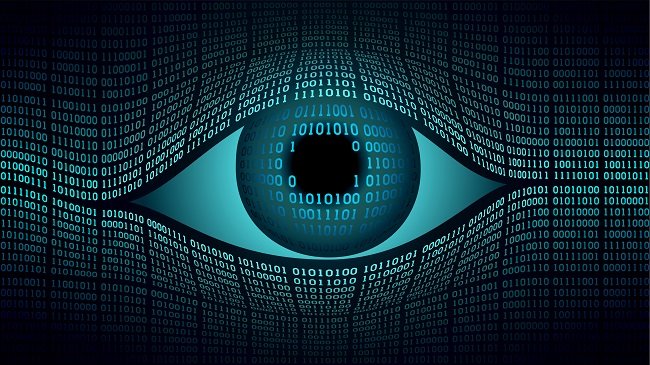
Why can 'experts' be inferior to algorithms? One reason is that they try to be clever, think outside the box, and consider complex combinations of features in making their predictions. Basically, justifying their existence (and pay cheque).
broken-leg rule
This is about extreme conditions that override a logical prediction. If a person is 90% chance of going to the movies, but you've received information that they've broken their leg and won't be going anywhere, then all bets are off. That was vital to the outcome.
do not simply trust intuitive judgment—your own or that of others—but do not dismiss it, either.
Speaks for itself. Use your (and others) intuition but don't rely on it. It has its place but it needs to be verified through other means.
planning fallacy
This ties in with optimism bias, where people inaccurately predict what is needed in a project. It will almost always be underestimated as you're looking at best-case (or at least not worst-case) scenarios. And there are curve balls that come that you couldn't have predicted too.
Many contractors - unofficially - make a lot of their profits on additions to the original plan.
Prospect theory
A behavioural model that shows how people decide between alternatives that involve risk and uncertainty. It was prospect theory that Kahneman and Tversky developed and part of what awarded the author the Nobel prize.
professional golfers putt more successfully when working to avoid a bogey than to achieve a birdie.
An example of loss aversion right here. This has been studied and born out by stats - perhaps they concentrate that little bit harder to stay on par, and a bit more 'lax' with the birdy as that would be a bonus rather than maintaining the status quo.
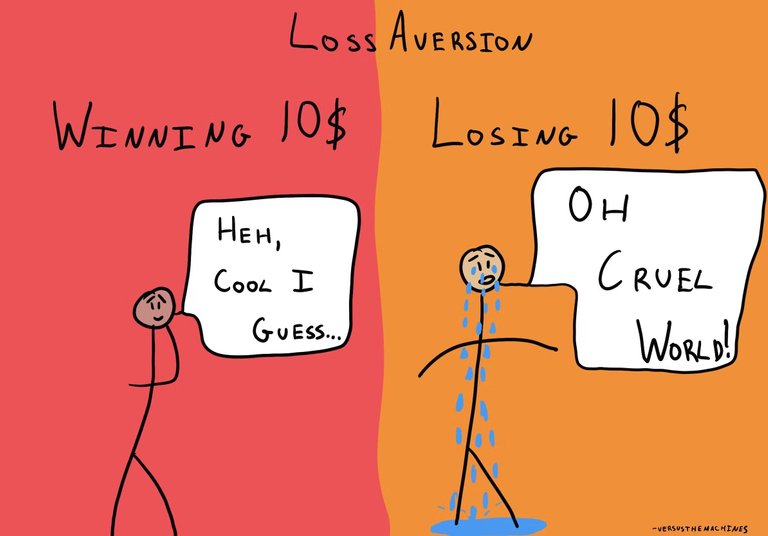
joint evaluation / single evaluation
Evaluating a scenario on its own or along with another scenario, strongly effects how it's perceived and the decision based on it.
The high-donation countries have an opt-out form / The low-contribution countries have an opt-in form
People are going to defer to not taking an action rather than taking it. So email signups would be much higher if they have to untick the box that if they need to check it to opt in.
The satiation level beyond which experienced well-being no longer increases was a household income of about $75,000 in high-cost areas
Can money buy happiness? Clearly, being poor is not desirable, and being rich has the potential to enhance life satisfaction… but it doesn't (on average) improve experienced wellbeing after a certain point.
most long-term circumstances of life, including paraplegia and marriage, are part-time states that one inhabits only when one attends to them.
Paraplegics, after an initial downturn in their mood following their accident, tend to be as happy as anyone else in the general sense. Of course, it takes some getting used to and there are exceptions, but once accepted and coped with, all people tend to 'level out' despite their circumstances.
Marriage is mentioned as there is far more to that than the excitement of a wedding. The honeymoon period is exactly that and there will be a levelling out there too!
it is much easier to identify a minefield when you observe others wandering into it than when you are about to do so.
A detached view of a situation. You can't really see it when you're in the mire, but can observe from a distance when others are walking to the abyss.
Thanks Daniel! Anything Else?
I'll wrap this up quickly as the quotes section was mammoth and that's with cutting a fair bit…
There were plenty of insights and many experiments and conundrums posed within. Not a quick, light read but one to get your teeth into if you want to study more in this area.
There are numerous elements we could jump into but there just isn't the space in this kind of article. I'd say it's a very important book which delves into the human thinking process and is required understanding.
Like I say, check out Predictably Irrational too as it is of the same ilk and treads similar ground.
Plenty to think about there… fast, slow or otherwise!
First image my own, others linked to source
Check out the others in the series…
- SHOE DOG - Phil Knight
- CRUSHING IT - Gary Vaynerchuk
- FINDING ULTRA - Rich Roll
- WOODEN - John Wooden
- RELENTLESS - Tim Grover
- ON WRITING - Stephen King
- START WITH WHY - Simon Sinek
- THE CHIMP PARADOX - Steve Peters
- ELON MUSK - Ashlee Vance
- WAY OF THE WOLF - Jordan Belfort
- THE SUBTLE ART… - Mark Manson
- GORILLA MINDSET - Mike Cernovich
- THE 10X RULE - Grant Cardone
- FLOW - Mihaly Csikszentmihalyi
- THE GO-GIVER - Bob Burg & John D. Mann
- BE OBSESSED OR BE AVERAGE - Grant Cardone
- NEVER SPLIT THE DIFFERENCE - Chris Voss
- IKIGAI - Héctor García & Francesc Miralles
- THE 5 SECOND RULE - Mel Robbins
- YOU ARE THE PLACEBO - Dr. Joe Dispenza
- DEEP WORK - Cal Newport
- CREATIVE MISCHIEF - Dave Trott
- THE E-MYTH REVISITED - Michael E. Gerber
- THE PERFECT DAY FORMULA - Craig Ballantyne
- SO GOOD THEY CAN'T IGNORE YOU - Cal Newport
- ATOMIC HABITS - James Clear
- OUTWITTING THE DEVIL - Napoleon Hill
- CAN'T HURT ME - David Goggins
- 50 MARATHONS IN 50 DAYS - Dean Karnazes
- GREENLIGHTS - Matthew McConaughey
- THE GLADIATOR MINDSET - Adam Peaty
- OPEN: AN AUTOBIOGRAPHY - Andre Agassi
- THE 1% RULE - Tommy Baker
- THE 5 LOVE LANGUAGES - Gary Chapman
- THE BRAIN THAT CHANGES ITSELF - Norman Doidge
- THE WAR OF ART - Steven Pressfield
- PREDICTABLY IRRATIONAL - Dan Ariely
- BORN TO RUN - Christopher McDougall
- THE ALMANACK OF NAVAL RAVIKANT - Eric Jorgenson
- ESSENTIALISM - Greg McKeown
- EAT & RUN - Scott Jurek
- THAT WILL NEVER WORK - Marc Randolph
- THE SECRET RACE - Tyler Hamilton
- 12 RULES FOR LIFE - Jordan Peterson
- THE GREATEST SALESMAN IN THE WORLD - Og Mandino
- THE MAGIC OF THINKING BIG - David Schwartz
- THINKING, FAST AND SLOW - Daniel Kahneman
- LETTING GO - David Hawkins
- MAN'S SEARCH FOR MEANING - Viktor Frankl
- NEVER FINISHED - David Goggins
OMG this book is something that I've always wanted to have and you summarized it really well here. I hope I can read them these days as it's one of must-read book for me that I didn't get the chance to read yet.
Thanks! Yeah, it's a good one with loads of in-depth analysis on influences, emotions and decisions. If you're into all the nuts and bolts of this kind of thing, then it's one of the main books in this area and worth a look. But you're right, there are many books out there and hard to find the time for them all!
Awesome breakdown of some crucial lessons from the book! Awesome illustrations too! (Did you make these yourself?)
It's fascinating how our minds have so many of these programs installed that screw up our decision making. They served us well back in prehistoric times, but way more people need to realize that they're walking around with "software" that's a few hundred millennia old! Without the awareness of what is happening in our minds, changing our lives will be infinitely more difficult.
Learning about these things has been a true eye opener for me.
This book is still on my reading list, but I have read Predictably Irrational in the past which was an awesome read for me! Sad to see that the vast majority of people aren't thinking on this level and kudos to you for helping to get a powerful and positive message out! :)
Thanks a lot for your comment!
You're right, these are important things to learn and be aware of and hopefully more people will take the time to get an understanding.
Only the first image is my own but the cool illustrations are linked to their source.
The rewards earned on this comment will go directly to the people( @adambarratt ) sharing the post on Twitter as long as they are registered with @poshtoken. Sign up at https://hiveposh.com.
Congratulations @adambarratt! You received a personal badge!
Thank you for participating in the Leo Power Up day.
You can view your badges on your board and compare yourself to others in the Ranking
Check out our last posts:
Support the HiveBuzz project. Vote for our proposal!